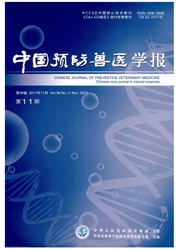

 中文摘要:
中文摘要:
为探讨不同禽源和不同毒力的新城疫病毒(NDV)株对鸭的感染性、致病性以及鸭在家禽新城疫(ND)流行中的意义,本研究选用7个NDV株进行了雏野鸭的人工感染试验,对感染鸭的临床症状、增重、抗体反应、排毒以及组织器官中病毒分布进行了观察。结果表明,鸭源强毒株JSD0812和标准强毒株F48E8对鸭具有强的致病性,感染鸭的发病率和死亡率高达100%,病毒广泛分布于感染鸭的多种组织器官中。鸽源强毒株JSP0204、鸡源强毒株JSC0804、鹅源强毒株JSG0210以及疫苗毒株Mukteswa和LaSota对鸭不具有致病性,感染鸭未出现临床症状,生长发育也未受到影响。它们在鸭体内存在时间也较短。所有感染鸭均有排毒现象,排毒时间和排毒途径因病毒株毒力不同而异。结果表明NDV在进化过程中对鸭的致病性有逐渐增强的趋势。
 英文摘要:
英文摘要:
In order to evaluate the importance of duck in the prevalence of Newcastle disease (ND), the infectivity and pathogenicity of seven Newcastle disease virus (NDV) strains from different avian origins were investigated by experimental infection in mallard ducklings. The clinical signs, weight gain, antibody response, virus shedding and virus distribution in tissues of infected ducklings were monitored, and the infectivity of different NDV strain in duckling was evaluated. The duck origin virulent strain JSD0812 and the Chinese standard virulent strain F48E8 were highly pathogenic to ducklings and caused 100 % morbidity and mortality with a wide virus distribution in tissues. Other virulent NDV strains, including JSP0204 from pigeon, JSC0804 from chicken, JSG0210 from goose origin virulent and vaccine strains Mukteswar and La Sota, showed no clinical or adverse effect on growth of infected duckling. Virus shedding was detectable in all ducklings, but the period and route varied with the virulence of NDV strains. The results indicated that the pathogenicity of NDV for ducks tends to increase over evolution, confirming that the ducks play an important role in the epidemiology of NDV.
 同期刊论文项目
同期刊论文项目
 同项目期刊论文
同项目期刊论文
 期刊信息
期刊信息
